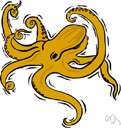tentacle
(redirected from Tentacles)Also found in: Thesaurus, Medical, Encyclopedia.
ten·ta·cle
(tĕn′tə-kəl)n.
1. Zoology
a. An elongated flexible unsegmented extension, as one of those surrounding the mouth of a sea anemone, used for feeling, grasping, or locomotion.
b. One of these structures in a cephalopod, typically being retractile and having a clublike end usually with suckers or hooks, in contrast to an arm, which is nonretractile and typically has suckers along the underside.
2. Botany One of the sensitive hairs on the leaves of certain insectivorous plants, such as a sundew.
3. A similar part or extension, especially with respect to the ability to grasp or stretch: an espionage network with far-reaching tentacles.
[New Latin tentāculum, from Latin tentāre, to feel, try; see tentative.]
ten·tac′u·lar (-tăk′yə-lər) adj.
American Heritage® Dictionary of the English Language, Fifth Edition. Copyright © 2016 by Houghton Mifflin Harcourt Publishing Company. Published by Houghton Mifflin Harcourt Publishing Company. All rights reserved.
tentacle
(ˈtɛntəkəl)n
1. (Zoology) any of various elongated flexible organs that occur near the mouth in many invertebrates and are used for feeding, grasping, etc
2. (Botany) any of the hairs on the leaf of an insectivorous plant that are used to capture prey
3. something resembling a tentacle, esp in its ability to reach out or grasp
[C18: from New Latin tentāculum, from Latin tentāre, variant of temptāre to feel]
ˈtentacled adj
ˈtentacle-ˌlike, tentaculoid adj
tentacular adj
Collins English Dictionary – Complete and Unabridged, 12th Edition 2014 © HarperCollins Publishers 1991, 1994, 1998, 2000, 2003, 2006, 2007, 2009, 2011, 2014
ten•ta•cle
(ˈtɛn tə kəl)n.
1. any of various slender, flexible processes or appendages in animals, esp. invertebrates, that serve as organs of touch, prehension, etc.; feeler.
2. a sensitive filament or hair on a plant, as one of the hairs of the sundew.
[1755–65; < New Latin tentāculum= Latin tentā(re), variant of temptāre to feel, probe + -culum -cle2]
ten′ta•cled, adj.
ten•tac′u•lar (-ˈtæk yə lər) adj.
Random House Kernerman Webster's College Dictionary, © 2010 K Dictionaries Ltd. Copyright 2005, 1997, 1991 by Random House, Inc. All rights reserved.
ten·ta·cle
(tĕn′tə-kəl) A narrow, flexible, unjointed part extending from the body of certain animals, such as an octopus, jellyfish, and sea anemone. Tentacles are used for feeling, grasping, or moving.
The American Heritage® Student Science Dictionary, Second Edition. Copyright © 2014 by Houghton Mifflin Harcourt Publishing Company. Published by Houghton Mifflin Harcourt Publishing Company. All rights reserved.
ThesaurusAntonymsRelated WordsSynonymsLegend:
Switch to new thesaurus
| Noun | 1. |  tentacle - something that acts like a tentacle in its ability to grasp and hold; "caught in the tentacles of organized crime" tentacle - something that acts like a tentacle in its ability to grasp and hold; "caught in the tentacles of organized crime" |
| 2. | tentacle - any of various elongated tactile or prehensile flexible organs that occur on the head or near the mouth in many animals; used for feeling or grasping or locomotion |
Based on WordNet 3.0, Farlex clipart collection. © 2003-2012 Princeton University, Farlex Inc.
Translations
مِجَس، ذِراع
пипало
tentacle
chapadlotykadlo
fangarmtentakel
lonkero
griparmur
čiuptuvas
tausteklis
chápadlo
dokunaçtentakül
Collins Spanish Dictionary - Complete and Unabridged 8th Edition 2005 © William Collins Sons & Co. Ltd. 1971, 1988 © HarperCollins Publishers 1992, 1993, 1996, 1997, 2000, 2003, 2005
Collins English/French Electronic Resource. © HarperCollins Publishers 2005
tentacle
Collins German Dictionary – Complete and Unabridged 7th Edition 2005. © William Collins Sons & Co. Ltd. 1980 © HarperCollins Publishers 1991, 1997, 1999, 2004, 2005, 2007
Collins Italian Dictionary 1st Edition © HarperCollins Publishers 1995
tentacle
(ˈtentəkl) noun a long, thin, flexible arm-like or horn-like part of an animal, used to feel, grasp etc. An octopus has eight tentacles.
Kernerman English Multilingual Dictionary © 2006-2013 K Dictionaries Ltd.